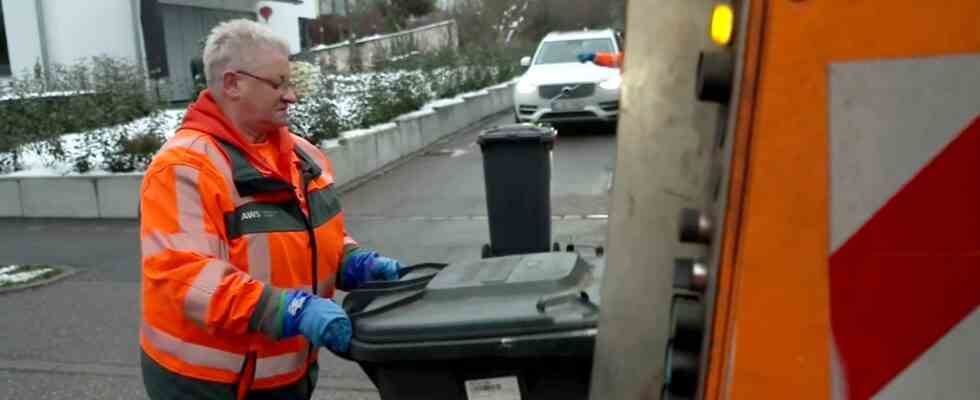Status: 01/24/2023 3:03 p.m
Garbage workers have a real backbreaking job – but they are paid comparatively poorly. They could particularly benefit from the collective bargaining in the public sector that started today.
At 6:45 sharp, Karin Seibel starts the engine of her garbage truck at the waste management depot in Stuttgart-Vaihingen. The service of the 56-year-old began at 6.15 a.m.
She has been working as a garbage truck driver for the city of Stuttgart for 25 years because she enjoys driving trucks. In the public sector, Seibel works even longer. More than 30 years ago she started in one of the Stuttgart swimming pools, later she did an apprenticeship in the city’s car workshop.
She now earns a net salary of 2,300 euros. Colleagues who are new to the job earn significantly less.
Collective bargaining in Potsdam for the public sector begins
Tim Diekmann, SWR, daily news at 12:00 p.m., January 24, 2023
Outside in wind and weather
Today, Seibel and her team are on a residual waste tour in the Degerloch district. Her three colleagues fetch the bins from the property, because in Stuttgart there is still the so-called “full service”, residents do not have to put their bins on the street. The 56-year-old steers the heavy garbage truck through the narrow streets. “At least there’s no more snow,” she says. Then she would need snow chains.
Even without snow, it’s a crisp three degrees cold. The garbage collectors have to go out in all weathers. In the summer it can quickly reach 40 or 50 degrees in the back of the car, reports Seibel. “It’s a very tough job,” she says. “You have to be physically very good at it. Otherwise you won’t be able to do it.” Many of her colleagues are physically exhausted after ten to 15 years. She is now the only woman in her department.
Ver.di: Appreciation through more money
But Seibel doesn’t let the men in her team work alone. She herself keeps getting out and helping with the garbage cans. For what everyone does here, the pay is far too bad, says the 56-year-old. She would need at least 500 euros more per month to be able to pay the increased costs for energy and food. For the fact that she and her colleagues pick up people’s rubbish every day, their work is valued far too little.
The trade union ver.di also says that wages urgently need to be increased. In the collective bargaining that started today in Potsdam, she is therefore demanding 10.5 percent more wages – but at least 500 euros per employee. “Appreciation is not only expressed verbally, but also through money,” says Jakob Becker, union secretary of the ver.di supply and disposal department in Stuttgart.
Even before the energy crisis, it was very difficult for garbage workers to make ends meet in cities like Stuttgart. “Now it’s much more difficult,” he says. If there is no agreement with the employers, indefinite strikes are also possible – in the worst case this means: mountains of rubbish on the streets.
Employers find demands unacceptable
The employers’ side considers the union’s demands to be unacceptable – this was announced by employer representatives in the run-up to the negotiations. Seibel’s employer is Stuttgart’s Mayor Frank Nopper (CDU).
He speaks of a balancing act for the municipalities. Because there are many important future tasks that cost the cities a lot of money – such as the creation of climate neutrality, the digitization of public administration or the renovation of schools. “Fair pay for employees in the public sector is one facet – but not the only one,” he says.
Nopper: both collective bargaining parties are responsible
The Mayor of Stuttgart does not see a refusal attitude on the part of the municipal employers. “Both bargaining parties are responsible for finding a reasonable compromise,” says Nopper. Under no circumstances should the collective bargaining conflict be carried out on the backs of the population.
For garbage truck driver Seibel, however, it is clear: If she does not get the hoped-for 500 euros more per month in the collective bargaining round, she will go on strike. Even if that means that the people of Stuttgart are left with their rubbish.

